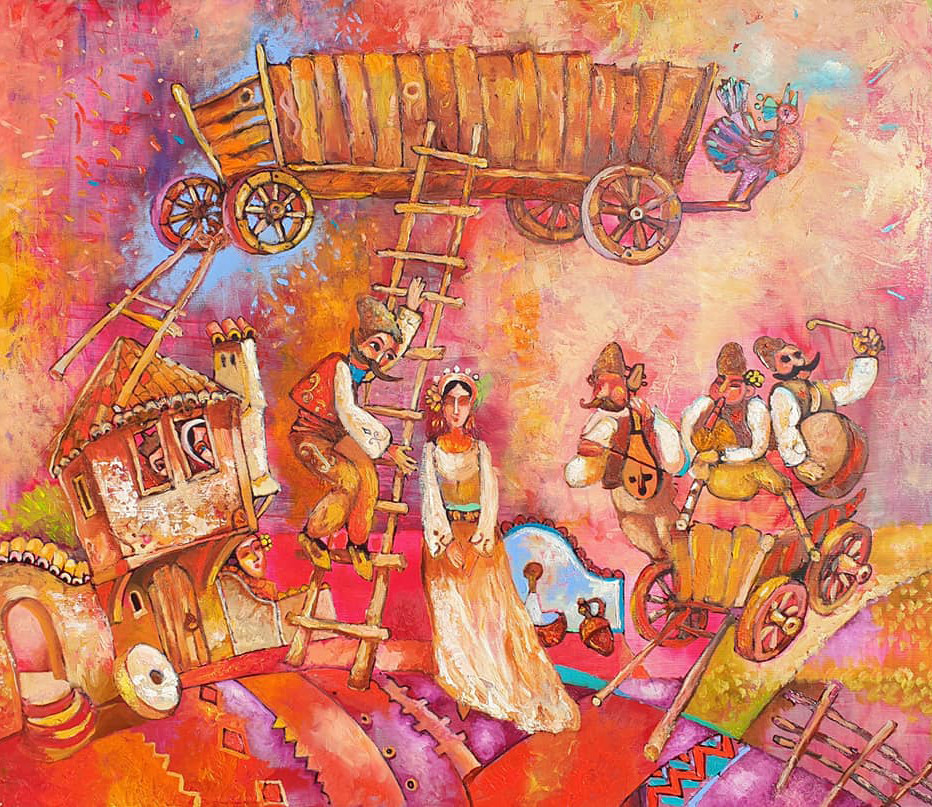 11
11
Villy Nikolov’s colourful paintings carry the sun of Spain, the smiles of childhood and so many stories anyone can discover and interpret, each in their own way. He says he has been drawing for as long as he can remember. “I made my first wall painting, as my family remembers it, at the age of three, using my father’s water colours (he too was an artist) and I did it with a flair – 2 by 3 metres,” Villy Nikolov says in an interview with Radio Bulgaria. He then started drawing classes, then came the secondary school of arts, then “printmaking” at the National Academy of Arts in Sofia. After winning a competition, he specialized modern art in Cuenca, Spain, and all of a sudden, found it to be a turning point in his work.

“I was in printmaking for so many years at the art school, then at the academy, we worked in black, white, grey… And then, all of a sudden, when I went to Spain with my grey prints, I was hit by the local colours, a bright red sun that really does make the ground look scarlet, as if it was a live painting by some surrealist. The few months I lived there changed all of my work, completely,” Villy Nikolov says in an interview with Radio Bulgaria’s Miglena Ivanova.

Alongside the fiery colours of Spain, his paintings frequently feature houses and separate elements like gates and windows, which he explains with his passion for architecture. And also – the wheel. As the artist himself says, the circle in his pictures first appeared when he was in the 5th or 6th grade, maybe even earlier. “I have painted wheels a lot – cogwheels, suns, round windows. Even now, so many years later, when I see a house with a round window, I stop to look at it. I take pictures, and then I paint it. To my mind, the circle is a symbol of movement, of freedom and the sun,” Villy Nikolov says.

At a concert by jazz musician Angel Zaberski at Studio 5 in Sofia, the artist found himself next to the stage where he literally felt the breath of the musicians and saw the sparkle of the instruments. The effect on him was so powerful that jazz entered his works and stayed there.
“With every instrument I noticed the musician making specific movements. The saxophone player – an array of different movements, eyes closed. The singer too has her eyes closed. The drummer is literally dancing. I try to convey all that in a static picture. That is a genre that will not be over for me because I love this music and I have a great deal of respect for the musicians. To my mind theirs is an extraordinary kind of job,” the artist says.
Villy Nikolov’s works convey a positive energy, provoking viewers to find the good things, the funny and comic things in the surrounding world which we would otherwise miss. Here is how he describes his own style:

“I call it fairytale surrealism with the colours of the sunset, of the sunrise, of the red earth, bathed in the strong sun. Fairytale because there is always some fooling around with nature, with architecture even. I have the same houses with smiles on, and you have to find out where they are. People are like houses. There is always some kind of tomfoolery going on, the viewer has to look at my pictures very carefully to see what’s hidden inside them.”
A multitude of ideas coexist in the mind of the artist, and he can often be seen working on several projects at a time, on the same canvas. But his pictures have gradually been changing of late.

“A minimalism has been creeping into my art. After so many details, after so many narratives, for several years I have been trying to strip-down the canvas. More background, no frills. There is more and more “crystal” in the canvases. I am beginning to paint with ice, with steam, with sunlight, with fewer details. I am now beginning to strip art down to a more crystal, calmer, and I hope a more elevated kind of art,” Villy Nikolov explains.
Photos courtesy of Villy Nikolov
Translated from the Bulgarian and posted by Milena Daynova
Although they came with the calling to uplift our world, the chosen ones not only followed their predetermined path, but also risked not fully revealing themselves because of their sacred duty to the Fatherland. Among these Renaissance Bulgarians was..
The Plovdiv Jazz Festival is celebrating its tenth birthday this year with a program, both in the summer and autumn, featuring some of the biggest names in the world of jazz. The autumn edition will announce the second largest city in Bulgaria - Plovdiv,..
The 138-minute Italian-French-Spanish biographical drama Limonov: The Ballad of Eddie (2024) has won the Grand Prize for Masterful Literary Adaptation at the CineLibri international feature film competition in Sofia. The film is an adaptation of..

+359 2 9336 661
